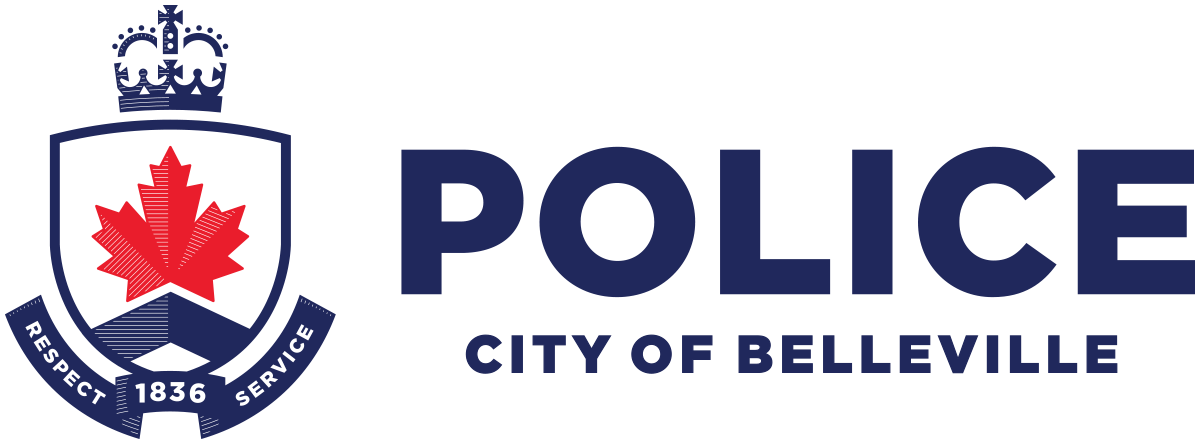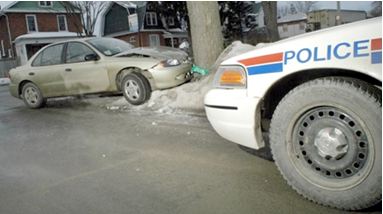Accidents ? Duty to Report
Accident Support Services provides an alternate and convenient means for individuals involved in prescribed motor vehicle collisions within the City of Belleville to attend in person and report the collision.
What is the Law?
The Highway Traffic Act requires that the following motor vehicle collisions be reported to the police:
Collisions involving personal injury
Collisions involving property damage in excess of $2,000
Collisions that cause damage to highway property (signs, guardrails, etc.)
What do I do when a motor vehicle collision occurs?
Call the Police
If you are involved in a serious motor vehicle collision where personal injury has occurred and medical attention is required, call 911. Do not move any vehicles.
If you are involved in a collision that is not of an emergency nature and there are minor injuries, call the police service at (613) 966-0882, and a police service member will determine whether an officer will attend the scene, or will direct you to Accident Support Services.
Exchange Information with the Other Involved Drivers
Where an accident occurs on a highway, every person in charge of a vehicle or street car that is directly or indirectly involved in the accident shall:
Remain at or immediately return to the scene of the accident
Render all possible assistance
Upon request, give in writing to anyone sustaining loss or injury or to any police officer or to any witness his/her name, address, driver's licence number and jurisdiction of issuance, motor vehicle liability insurance policy insurer and policy number, name and address of the registered owner of the vehicle, and the vehicle permit number.
For more information on the Highway Traffic Act regarding records and reporting of accidents and convictions, please visit the HTA website.
How to Report the Collision
Any reportable collision must be reported forthwith and you must report to Accident Support Services, 459 Sidney St, Belleville, in person. Upon arrival at the centre, citizens are greeted by a member of Accident Support Services staff who will provide help to complete the police report, apply the Damage Reported to Police sticker, photograph the damage to the vehicle, and offer the customer the opportunity to contact family, broker, or insurance company directly from Accident Support Services, giving the citizen a one-stop service opportunity for all their reporting needs. Police personnel are also available as needed to assist with the accident report.
Duty to report accident - 199 (1) HTA
Every person in charge of a motor vehicle or street car who is directly or indirectly involved in an accident shall, if the accident results in personal injuries or in damage to property apparently exceeding an amount prescribed by regulation, report the accident forthwith to the nearest police officer and furnish him/her with the information concerning the accident as may be required by the officer under subsection (3). R.S.O. 1990.cH.8, s. 199(1); 2002, c 17, Schedule F, Table
Officer May Direct Person to Report Accident at another Location - 199 (1.1) HTA
If, on reporting the accident to the nearest police officer under subsection (1), the person is directed by the officer to report the accident at a specified location, the person shall not furnish the officer described in subsection (1) with the information concerning the accident but shall forthwith attend at the specified location and report the accident there to a police officer and furnish him/her with the information concerning the accident as may be required by the officer under subsection (3)
Failure to Report the Collision
If you do not report to Accident Support Services forthwith, you could be charged with an offence under the Highway Traffic Act.
Hours Of Operation
Monday through Friday
9:00 a.m. to 5:00 p.m.
Saturday, Sunday and Statutory Holidays
Closed
Contact Information
Telephone: (613) 967-1700
Questions and Answers
What if I give my Driver's License and insurance information to the other driver and they loses it and later claims I did not provide the information? Will I be charged with failing to provide the information?
Laying a charge is at the discretion of a police officer, who is required to prove the charge with supporting evidence. However, if you also report the collision at the location identified to you by the police as soon as possible, or when directed by the police, you would have shown responsibility and would not likely be charged.
What if I don't know the cost of the damage to my vehicle at the time of the collision?
There are no official guidelines for determining the total cost of damage to all vehicles or property at the time of a collision. Where the motorist is uncertain whether the cost of damage exceeds $2000, it is recommended he or she reports the collision.
Is there a time period in which I have to report the collision to the police or go to a collision reporting centre?
You should report to the police as soon as possible or when directed by the police. At that time, you will be informed about the reporting procedures for the police in that area, including the time frame to report to the location specified by the police officer(s).
Will the police still come to investigate my collision, even if no one was hurt? What if I want them to witness the condition of my car or the position of the vehicles involved in the collision?
With property damage collisions, it should not be necessary for a police officer to note the on-scene condition of your car or its position on the road. Legislated rules for no-fault and fault determination do not require confirmation from a police officer. Your vehicle condition and damage will be inspected and noted by a police officer at the reporting centre or police station. When reporting the collision, you should state your concerns and you will be informed as to the policy in place for the police in that jurisdiction.
How will I know where to report the collision?
Phone the police whenever a collision occurs. Advise them of all important information about the collision, such as injuries and driver condition if impairment is suspected. You will be directed where to go so the report on the collision can be completed or if you should stay at the scene of the collision and wait for a police officer to attend.
What if I live in a location where there are no alternative methods of reporting a collision?
When reporting to police, they will inform you exactly what your options are in terms of reporting the collision.
What if I live in a different city than where the collision occurred?
Contact the police service in the jurisdiction where the collision occurred. They will advise you of the policy in place to deal with this issue.
What should I do with my vehicle after a collision occurs? If I'm in the middle of the road, should I try to move it to the side, or do the police need to see my car in the exact position when the collision occurred?
If the vehicles can be safely moved and there are no injuries or fatalities involved, remove the vehicles from the flow of traffic and contact the local police service for instructions on how to proceed.
What if I don't have a cell phone or any access to a phone to contact the police at the time of the collision?
Exchange information as required with the other driver(s) involved in the collision and proceed to a location where you can contact the police.
Can all collisions be self-reported?
Collisions involving property damage only, where the total cost of damage to all vehicles exceeds $2000, can be self-reported. Police will attend all collisions involving injuries or fatalities, damage to public property, hazardous or dangerous goods, where there is a possibility the driver is impaired, or where circumstances warrant police attendance.
For further information, visit the Ministry of Transportation Web site.




